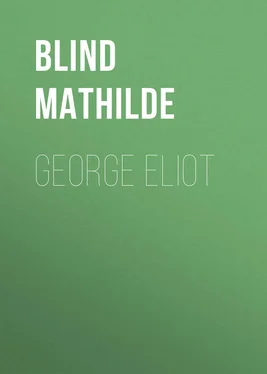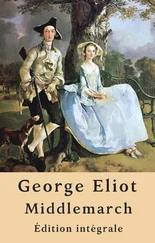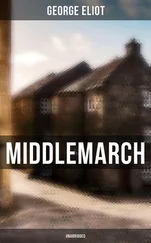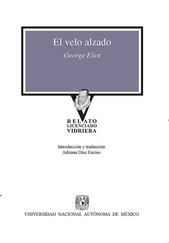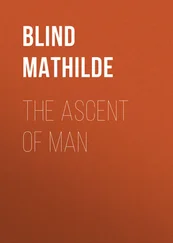Mathilde Blind - George Eliot
Здесь есть возможность читать онлайн «Mathilde Blind - George Eliot» — ознакомительный отрывок электронной книги совершенно бесплатно, а после прочтения отрывка купить полную версию. В некоторых случаях можно слушать аудио, скачать через торрент в формате fb2 и присутствует краткое содержание. ISBN: , Жанр: foreign_antique, foreign_prose, Биографии и Мемуары, на английском языке. Описание произведения, (предисловие) а так же отзывы посетителей доступны на портале библиотеки ЛибКат.
- Название:George Eliot
- Автор:
- Жанр:
- Год:неизвестен
- ISBN:http://www.gutenberg.org/ebooks/36847
- Рейтинг книги:3 / 5. Голосов: 1
-
Избранное:Добавить в избранное
- Отзывы:
-
Ваша оценка:
- 60
- 1
- 2
- 3
- 4
- 5
George Eliot: краткое содержание, описание и аннотация
Предлагаем к чтению аннотацию, описание, краткое содержание или предисловие (зависит от того, что написал сам автор книги «George Eliot»). Если вы не нашли необходимую информацию о книге — напишите в комментариях, мы постараемся отыскать её.
George Eliot — читать онлайн ознакомительный отрывок
Ниже представлен текст книги, разбитый по страницам. Система сохранения места последней прочитанной страницы, позволяет с удобством читать онлайн бесплатно книгу «George Eliot», без необходимости каждый раз заново искать на чём Вы остановились. Поставьте закладку, и сможете в любой момент перейти на страницу, на которой закончили чтение.
Интервал:
Закладка:
About the age of fifteen Marian Evans left the Misses Franklin, and soon afterwards she had the misfortune of losing her mother, who died in her forty-ninth year. Writing to a friend in after life she says, "I began at sixteen to be acquainted with the unspeakable grief of a last parting, in the death of my mother." Less sorrowful partings ensued, though in the end they proved almost as irrevocable. Her elder sister, and the brother in whose steps she had once followed "puppy-like," married and settled in homes of their own. Their different lots in life, and the far more pronounced differences of their aims and ideas, afterwards divided the "brother and sister" completely. This kind of separation between people who have been friends in youth is often more terrible to endure than the actual loss by death itself, and doth truly "work like madness in the brain." Is there not some reference to this in that pathetic passage in 'Adam Bede:' "Family likeness has often a deep sadness in it. Nature, that great tragic dramatist, knits us together by bone and muscle, and divides us by the subtler web of our brains, blends yearning and repulsion, and ties us by our heartstrings to the beings that jar us at every movement … we see eyes – ah! so like our mother's, averted from us in cold alienation."
For some years after this Miss Evans and her father remained alone together at Griff House. He offered to get a housekeeper, as not the house only, but farm matters, had to be looked after, and he was always tenderly considerate of "the little wench" as he called her. But his daughter preferred taking the whole management of the place into her own hands, and she was as conscientious and diligent in the discharge of her domestic duties as in the prosecution of the studies she carried on at the same time. One of her chief beauties was in her large, finely-shaped, feminine hands – hands which she has, indeed, described as characteristic of several of her heroines; but she once pointed out to a friend at Foleshill that one of them was broader across than the other, saying, with some pride, that it was due to the quantity of butter and cheese she had made during her housekeeping days at Griff. It will be remembered that this is a characteristic attributed to the exemplary Nancy Lammeter, whose person gave one the idea of "perfect unvarying neatness as the body of a little bird," only her hands bearing "the traces of butter making, cheese crushing, and even still coarser work." Certainly the description of the dairy in 'Adam Bede,' and all the processes of butter making, is one which only complete knowledge could have rendered so perfect. Perhaps no scene in all her novels stands out with more life-like vividness than that dairy which one could have sickened for in hot, dusty streets: "Such coolness, such purity, such fresh fragrance of new-pressed cheese, of firm butter, of wooden vessels perpetually bathed in pure water; such soft colouring of red earthenware and creamy surfaces, brown wood and polished tin, grey limestone and rich orange-red rust on the iron weights and hooks and hinges."
This life of mixed practical activity and intellectual pursuits came to an end in 1841, when Mr. Evans relinquished Griff House, and the management of Sir Roger Newdigate's estates, to his married son, and removed with his daughter to Foleshill, near Coventry.
CHAPTER III.
YOUTHFUL STUDIES AND FRIENDSHIPS
The period from about twenty to thirty is usually the most momentous in the lives of illustrious men and women. It is true that the most abiding impressions, those which the future author will reproduce most vividly, have been absorbed by the growing brain previous to this age; but the fusion of these varied impressions of the outward world with the inner life, and the endless combinations in which imagination delights, rarely begin before. Then, as a rule, the ideas are engendered to be carried out in the maturity of life. Alfred de Vigny says truly enough:
"Qu'est-ce qu'une grande vie?
Une pensée de la jeunesse, exécutée par l'âge mur."
Moreover, it is a revolutionary age. Inherited opinions that had been accepted, as the rotation of the seasons, with unhesitating acquiescence, become an object of speculation and passionate questioning. Nothing is taken upon trust. The intellect, stimulated by the sense of expanding and hitherto unchecked capacity, delights in exercising its strength by critically passing in review the opinions, laws, institutions commonly accepted as unalterable. And if the intellect is thus active the heart is still more so. This is emphatically the time of enthusiastic friendship and glowing love, if often also of cruel disenchantment and disillusion. In most biographies, therefore, this phase of life is no less fascinating than instructive. For it shows the individual while still in a stage of growth already reacting on his environment, and becoming a motive power according to the measure of his intellectual and moral endowments.
It is on this state of George Eliot's life that we are now entering. At Foleshill she acquired that vast range of knowledge and universality of culture which so eminently distinguished her.
The house she now inhabited though not nearly as picturesque or substantial as the former home of the Evanses, was yet sufficiently spacious, with a pleasant garden in front and behind it; the latter, Marian Evans was fond of making as much like the delicious garden of her childhood as was possible under the circumstances. In other respects she greatly altered her ways of life, cultivating an ultra-fastidiousness in her manners and household arrangements. Though so young she was not only entire mistress of her father's establishment but, as his business required him to be abroad the greater part of each week, she was mostly alone.
Her life now became more and more that of a student, one of her chief reasons for rejoicing at the change of residence being the freer access to books. She had, however, already amassed quite a library of her own by this time. In addition to her private studies, she was now also able to have masters to instruct her in a variety of subjects. The Rev. T. Sheepshanks, headmaster of the Coventry Grammar-school, gave her lessons in Greek and Latin, as she particularly wished to learn the former language in order to read Æschylus. She continued her study of French, German, and Italian under the tuition of Signor Brezzi, even acquiring some knowledge of Hebrew by her own unassisted efforts. Mr. Simms, the veteran organist of St. Michael's, Coventry, instructed her in the pianoforte; and probably Rosamond Vincy's teacher in 'Middlemarch' is a faithful portraiture of him. "Her master at Mrs. Lemon's school (close to a country town with a memorable history that had its relics in church and castle) was one of those excellent musicians here and there to be found in the provinces, worthy to compare with many a noted Kapellmeister in a country which offers more plentiful conditions of musical celebrity." George Eliot's sympathetic rendering of her favourite composers, particularly Beethoven and Schubert, was always delightful to her friends, although connoisseurs considered her possessed of little or no strictly technical knowledge. Be that as it may, many an exquisite passage scattered up and down her works, bears witness to her heartfelt appreciation of music, which seems to have had a more intimate attraction for her than the fine arts. She shows little feeling for archæological beauties, in which Warwickshire is so rich: in her 'Scenes of Clerical Life' dismissing a fine monument of Lady Jane Grey, a genuine specimen of old Gothic art at Astley Church, with a sneer about "marble warriors, and their wives without noses."
In spite of excessive study, this period of Marian's life is not without faint echoes of an early love-story of her own. In the house of one of her married half-sisters she met a young man who promised, at that time, to take a distinguished position in his profession. A kind of engagement, or semi-engagement, took place, which Mr. Evans refused to countenance, and finally his daughter broke it off in a letter, showing both her strong sense and profoundly affectionate nature. At this time she must have often had a painful consciousness of being cut off from that living fellowship with the like-minded so stimulating to the intellectual life. Men are not so subject to this form of soul hunger as women; for at their public schools and colleges they are brought into contact with their contemporaries, and cannot fail to find comrades amongst them of like thoughts and aspirations with themselves. A fresh life, however, at once vivifying to her intellect and stimulating to her heart, now began for Marian Evans in the friendship she formed with Mr. and Mrs. Charles Bray of Rosehill, Coventry. Rahel – the subtly gifted German woman, whose letters and memoirs are a treasury of delicate observation and sentiment – observes that people of marked spiritual affinities are bound to meet some time or other in their lives. If not entirely true, there is a good deal to be said for this comforting theory; as human beings of similar nature seem constantly converging as by some magnetic attraction.
Читать дальшеИнтервал:
Закладка:
Похожие книги на «George Eliot»
Представляем Вашему вниманию похожие книги на «George Eliot» списком для выбора. Мы отобрали схожую по названию и смыслу литературу в надежде предоставить читателям больше вариантов отыскать новые, интересные, ещё непрочитанные произведения.
Обсуждение, отзывы о книге «George Eliot» и просто собственные мнения читателей. Оставьте ваши комментарии, напишите, что Вы думаете о произведении, его смысле или главных героях. Укажите что конкретно понравилось, а что нет, и почему Вы так считаете.
